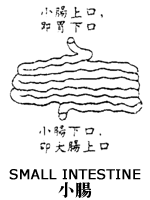Small Intestine Functions
 The upper opening of the small intestine connects with the stomach through the pylorus, the lower opening of the small in connects with the large intestine through the ileocaecal valve. In TCM theory, the functions of the small intestine are below:
The upper opening of the small intestine connects with the stomach through the pylorus, the lower opening of the small in connects with the large intestine through the ileocaecal valve. In TCM theory, the functions of the small intestine are below:Small intestine rules containing and transforming
The small intestine receives what the stomach has not completely digested, and keep the material to stay for further digested into nutrients. The process in the small intestine includes separating the "pure" from the "impure." Like the stomach, the small intestine sends the refined essence (pure) to the spleen where the essence are transformed in nutrient essence and distributed throughout the body, the waste part (impure) is directed down into the large intestine. If this action of the small intestine is abnormal, there will be disturbance in digestion and absorption, leading to abdominal distention, diarrhea and loose bowels.Small intestine rules separation of pure and impure
Besides separating the food and drinks into pure and impure forms, the small intestine also absorb most of the water from its content. Any useless water produced in the digestion process will be sent to the bladder and stored as urine. As a result, healthy small intestine functions are essential for normal urination and defecation. If the small intestine fails to perform this function, individuals not only have digestive symptoms such as abdominal distention and pain, but also experience urinary or defecation problems, such as scanty urine and loose bowels. Clinically, physicians often apply urination method to promote the stools in shape. The actions of the small intestine in food digestion and absorption as well as fluid metabolism are closely cooperated and promoted by the spleen and stomach, through their ascending pure and descending impure actions. For problems in the small intestine that manifested abdominal distention and pain, vomiting, constipation, loose bowels and diarrhea, physicians often provide remedies that aim to treat the spleen and stomach mostly.
In addition, the small intestine and heart are connected and communicated with each other through their meridians, this relationship shows a significantly influence in their pathological aspect. For example, excess fire in the heart can pass downwards to the small intestine, leading to urinary frequency, bloody urine, burning and painful urination. In the contrast, heat accumulated in the small intestine can also stir up the heart, leading to irritability, insomnia, a bright red tongue, and mouth sores. Clinically, physicians often apply urination method to clear the heart fire.
Click here to read more about the Small Intestine Meridian.


